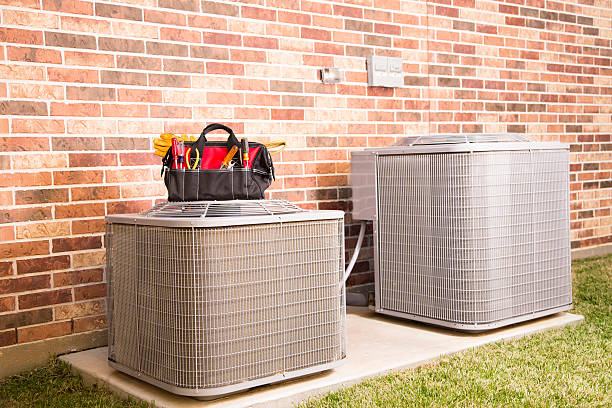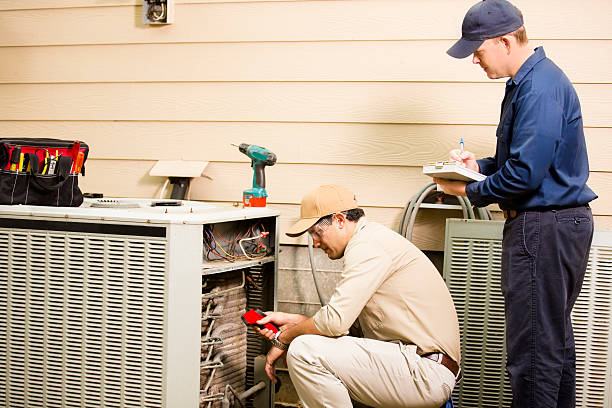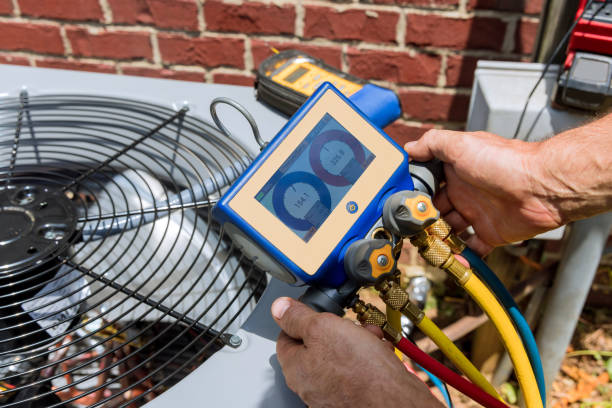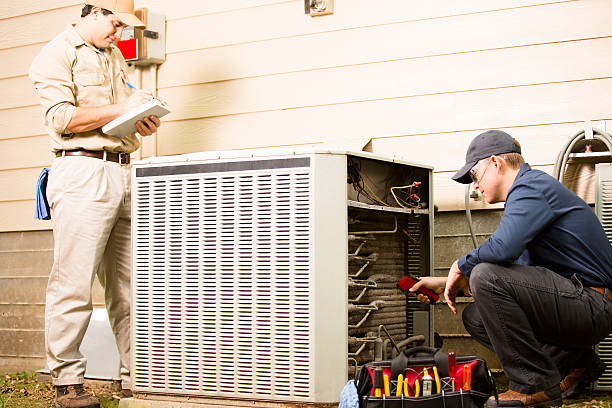
The Ultimate Guide to HVAC installations and Repairing
These days, both homes and businesses need to have nice indoor environments. This means that they need HVAC systems that work well. The Ultimate Guide to HVAC Installations and Repairing is a complete guide that covers everything from the basics of HVAC parts to the most complicated aspects of installation and repair. This guide is helpful if you’re thinking about getting a new system or trying to figure out what’s wrong with the one you already have. It talks about different HVAC systems, common problems, and how to keep them in good shape. With the help of professional advice and useful data, you’ll be able to make smart choices that will keep your HVAC system running smoothly for years to come. Let’s jump in and look at the important stuff!

Basics of HVAC Systems
When it comes to creating a comfortable outdoor environment, understanding the basics of HVAC systems is essential. HVAC stands for Heating, Ventilation, and Air Conditioning. It is very important to keep the temperature and quality of the air inside your home stable. For outdoor areas, you might want to hire Ground Lighting System experts to make your landscape look better. They specialize in Landscape Lighting Installations and repairing, ensuring your garden and pathways are beautifully illuminated. Also, if you have a pool, working with a reputable Pool Lighting System company can make your time outside more enjoyable. The right lighting not only makes your outdoor spaces look better, but it also makes them safer and easier to use.
Types of HVAC Systems
HVAC stands for heating, ventilation, and air cooling. There are different types of HVAC systems, and each has its own benefits and uses. You can pick the best HVAC system for your needs if you know about the different types.
- Central Air Conditioning Systems
For bigger homes and buildings, central air conditioning systems are the most popular choice. These systems have a main unit that cools the air and sends it to different parts of the room through a network of pipes. They keep temperatures inside stable and do a good job of controlling humidity. You can use a central system to heat or cool your home, so it’s a good choice for all year comfort.
- Ductless Mini-Split Systems
Ductless mini-split systems are great for homes that don’t have ducts or for people who want to add heating and cooling to certain areas. Each system has a compressor unit outside and one or more air moving units inside. This set-up lets you control the temperature in each room separately, which saves energy. Also, ductless systems are pretty simple to set up and don’t need much work.
- Heat Pumps
Heat pumps can be used to heat or cool your home, depending on what you need. Their very high efficiency comes from the fact that they move heat from inside to outside instead of making heat. Most heat pumps get their heat from the air. Geothermal heat pumps, on the other hand, use the stable temperature of the earth’s crust to heat and cool. These systems work best in mild temperatures and can cut your energy bills by a large amount.
- Fire places
As a standard way to heat a home, furnaces are usually powered by natural gas, electricity, or oil. They use pipes to heat air and send it all over the house. Furnaces are known for working well in colder places, keeping you warm even during the coldest months. Furnaces need to be serviced regularly to make sure they last and work well.
- Geothermal Systems
Geothermal HVAC systems use the earth’s heat to heat and cool your home, so they are very energy-efficient. There are a bunch of underground lines filled with fluid that either soaks up or sends heat away depending on the situation. Geothermal systems are more expensive to install at first than standard systems, but they save you a lot of money on energy bills over time and are better for the environment.
- Hybrid Systems
Hybrid systems use both traditional ways of heating and cooling and green energy sources, like solar panels. Based on how much energy is needed and the weather outside, these systems can switch between a regular heater or heat pump and a solar system. This ability to adapt can save a lot of energy and cut down on carbon pollution.
Signs You Need HVAC Installation
It is important to know when to put a new HVAC system in order to keep your home comfortable. Here are some important signs that your current system might need to be replaced.
- Frequent Breakdowns
One of the best ways to tell if your HVAC system is failing is if it breaks down often. In the event that you need to schedule fixes more than once during a single season, it means that your system is having trouble working properly. Repairs that need to be done all the time can be annoying and cost a lot over time. Getting a new HVAC system might give you more reliable performance and lower the general cost of repairs that you have to make all the time.
- Inefficient Heating or Cooling
Is the weather in your home changing all the time? If some places are too hot and others are too cold, it means that your HVAC system isn’t moving air around as well as it should. This waste could be caused by a number of things, including an old system or the wrong size. Getting a new HVAC system that is the right size can make your house more comfortable and save you money.
- High Energy Bills
If your energy bills go up without warning, it could mean that your HVAC system is working harder than it should be. If your costs go up a lot even though you don’t change how you use the system, it may not be working as well as it should because it is old or has technical problems. A new HVAC system that uses less energy can help you save money on your power bills and make your home more comfortable.
- Age of the System
How old your HVAC system is is a very important factor in figuring out if it needs to be replaced. Almost all of them last between 10 and 15 years. If your system is getting close to or past this age, it might not work as well as newer types. As HVAC technology changes, newer systems use less energy, which can save you a lot of money on heating and cooling bills. You might want to consider upgrading your system to get the best speed and dependability.
Preparing for HVAC Installation
It’s important to get ready for HVAC installation experts so that the process goes smoothly and quickly. By taking the time to plan carefully, you can save time and money and get the most out of your new system. When getting ready for your HVAC work, here are some important things to keep in mind.
- Assessing Your Home’s Needs
It’s important to figure out how much heating and cooling your house needs before installation. Think about things like your home’s size, how well it is insulated, and how many windows and doors it has. These things can affect what size and type of HVAC system you need. You can figure out if you need a central system, ductless mini-splits, or a heat pump by doing a complete assessment. You can also get useful information about your unique needs by talking to a professional HVAC contractor.
- Choosing the Right HVAC System
Picking the right HVAC system for your home is the next step after knowing what it needs. Rates of energy economy, system size, and type (central air, ductless, heat pump, etc.) should all be taken into account. Seasonal Energy Efficiency Ratio (SEER) methods are better because they use less energy and cost less in the long run. Find the best HVAC system for your home and your budget by looking into different models and talking to pros.
- Budgeting for Installation
Making a budget is an important part of installing HVAC systems correctly. Think about not only the price of the unit itself, but also the cost of installation, any permits needed, and any changes that need to be made to your home’s electricity or ductwork systems. Even though it might be tempting to go with the cheapest choice, buying a good system will save you money in the long run on repairs and energy costs. Also, make sure you set aside money for possible updates or extra features that could make your system work better.
- Finding a Qualified HVAC Contractor
It is very important to choose the right HVAC expert for the job. Find people in your area who are licensed, insured, and have a lot of experience. See what other people have said about them online, ask friends or family for recommendations, and look at their credentials. A skilled contractor will not only help you pick the right system, but they will also make sure it is installed correctly and in line with local building codes. Set up meetings with several contractors to get quotes and choose the one whose prices and services fit your wants and budget.

The HVAC Installation Process
Installing your heating, ventilation, and air conditioning system is a very important step in making sure it works well and quickly. Being aware of each step can help you get ready for the work and set reasonable goals. Here is a full list of everything you can expect during the HVAC construction process.
- Initial Consultation
Having a meeting with the contractor you’ve picked is the first step in installing an HVAC system. The worker will look at your home’s heating and cooling needs during this meeting. They will look at things like your home’s size, insulation, and any ducting that is already there. You can talk about your preferences, budget, and any unique needs you may have during this consultation. The professional will then suggest HVAC systems that are right for your home based on what they find.
- System Design and Sizing
After the first meeting, the contractor will build and measure your new HVAC system. The right size is important for the best performance; a system that is too big can waste energy, and one that is too small may have trouble keeping temperatures comfortable. The contractor will figure out the right load needs using standard methods in the industry. They will look at things like how your home is laid out and the weather in your area. This makes sure that your new system will heat and cool your home well while using the least amount of energy possible.
- Installation Day: What to Expect
Your HVAC system need routine maintenance in order to function properly. Stuck air filters are a common issue that can hinder air flow through the system and increase its workload. Your energy costs may increase as a result, and the indoor air quality may deteriorate. Similar to this, over time, dust and other material can plug registers. It’s crucial to regularly inspect and replace your air filters as well as get your ducts cleaned when necessary. Improving airflow and system performance can be achieved simply by changing the filter. The ducts in your house should be cleaned to maintain clean, healthy air.
- Final Inspection and Testing
After the installation is done, there will be one last check and test. The worker will make sure that all of the system’s parts are working properly by checking them all. This means checking the thermostat, looking for leaks in the refrigerant, and making sure that breathing is even throughout the house. In addition, the contractor will give you directions on how to properly use and care for your new system. During this time, it’s important to ask any questions you have to make sure you are happy with your new HVAC system.
Common HVAC Repairs
Keeping your HVAC system in good shape is important for keeping your home or business comfortable. But problems can happen with even the best methods over time. Knowing how to do common HVAC repairs can help you spot issues early and take the right steps to fix them. Here is a list of common HVAC fixes and what they mean.
- Leaks of coolant
For your HVAC system to cool down, you need refrigerant. If your system doesn’t have enough refrigerant, it could mean there is a leak. Not enough cooling, ice growth on the coils, or hissing sounds near the unit are all signs of a refrigerant leak. To fix a refrigerant leak, you have to find the cause, seal it, and add the right amount of refrigerant to the system again. Not taking care of this problem could cause the system to work less efficiently, cause your energy bills to go up, and even damage the motor.
- Thermostat Issues
The thermostat sets the temperature for your HVAC system. If you change the temperature and your system doesn’t react or turns on and off a lot, there may be a problem with the thermostat. Problems that happen a lot include dead batteries, wiring issues, or the thermostat not being set properly. In some cases, the problem can be fixed by recalibration or replacing the batteries. For more complicated issues, you may need to get help from an expert or replace the thermostat.
Faulty Wiring
Another common problem that can make your HVAC system not work right is bad wiring. The wires can fray, break, or corrode over time, which can cause power outages or short circuits. Flickering lights, strange noises, or frequent system shutdowns are all signs of bad wiring. Working with electrical parts can be dangerous, so this kind of fix should only be done by a trained professional. For safety and smooth system running, proper wiring is a must.
- Clogged Filters and Ducts
For your HVAC system to work well, it needs to be serviced regularly. One common problem is air filters that get stuck, which can stop air from moving through the system and make it work harder. This could cause your energy bills to go up and the air quality inside to get worse. In the same way, vents can get clogged up with dust and other things over time. It’s important to check and change air filters often and have your ducts cleaned when they need it. Changing the filter is an easy way to improve airflow and system performance. Cleaning the ducts keeps the air in your home clean and healthy.
Maintaining Your HVAC System
Regular repair is the best way to make sure that your HVAC system works at its best and lasts as long as possible.
- Regular Maintenance Checklist
Make a maintenance plan with things to do like cleaning the coils, changing the filters, checking the ducts for blockages, and checking the insulation. With regular maintenance, you can avoid big problems in the future.
- Seasonal Tune-Ups
To make sure your system works well, have a professional tune it up at the start of each heating and cooling season. This proactive method helps find problems and fix them before they get worse.
- Importance of Changing Filters
Changing your HVAC filters on a regular basis makes the air inside your home better and the system work better. Filters that are clogged stop air from moving through your system, which makes it work harder and costs more to run.
The Benefits of Professional HVAC Services
Paying for skilled HVAC services has many benefits that can make your system work better.
- Expertise and Experience
Because they are highly skilled and knowledgeable, professional HVAC technicians can ensure that installations and repairs are completed correctly and promptly.
- Warranty Protection
A lot of HVAC systems come with guarantees that say they need to be installed and maintained by a professional. Hiring licensed contractors is a good way to keep your property safe.
- Long-Term Cost Savings
Regular professional maintenance can find problems early on, saving you money on fixes and making your HVAC system last longer. High-efficiency systems can also lower your energy bills by a large amount over time.

Conclusion
In conclusion, hiring professional technicians for commercial hvac maintenance is crucial for ensuring optimal performance and longevity. Because they have specialized knowledge and tools, they can find possible problems early on, which lowers the risk of costly breakdowns and downtime. Not only does regular repair protect valuable inventory, it also makes sure that you’re following industry standards, which keeps you from getting fined. Businesses can improve reliability, save a lot of money, and use less energy by putting professional services first. This makes the business more productive and long-lasting generally.
